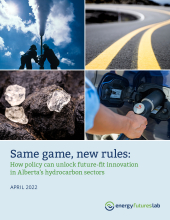As international efforts to reduce emissions and adapt to climate impacts grow in ambition, the energy dialogue is now focused on actions to match the scale of the challenge. This includes the development of quantifiable criteria, tools, and frameworks to guide decision-making for climate-smart investment. This report makes the case for future-fit hydrocarbons as a critical economic path forward for Canada that responds to such pressures now shaping energy investment, with the province of Alberta at the epicenter of this opportunity.
The scaling of future-fit hydrocarbon industries represents a marked change for traditional hydrocarbon development. Businesses, Indigenous Rights and Title Holders (Rights Holders), and communities committed to supporting the province’s economy and taking action on climate have an opportunity to benefit from this shift; but to do so, public policy will continue to be instrumental to support emerging transition pathways and build private sector and investor confidence in these new opportunities.
Same Game, New Rules: How policy can unlock future-fit innovation in Alberta’s hydrocarbon sectors provides guidance for policymakers exploring a diverse range of economic proposals that align with the Energy Futures Policy Collaborative (EFPC) definition of future-fit hydrocarbons. It underscores a new narrative emerging for Alberta and a series of policy proposals that can help create the right conditions for province’s hydrocarbon sector to realize these opportunities at scale, clearly showing that resource development in Canadian energy sectors can align with a net-zero future, Indigenous reconciliation, and a number of other priorities important to Albertans – if it is thoughtful, market-oriented and supported by a common vision of a strong future.
This report is sponsored by the Energy Futures Lab (EFL), an initiative of The Natural Step Canada. It provides a conceptual framework for the efforts of the EFL’s Policy Collaborative (EFPC) that was launched to explore the role of public policy for attracting investment into ‘future-fit hydrocarbon’ industries. Smart Prosperity Institute is a member of the EFPC.
The EFPC framework identifies six strategic areas where governments need to align and accelerate policy development to amplify climate action while Alberta continues to reap the economic benefits of hydrocarbon activity. Achieving this requires adopting a new mindset for how we think about our energy systems – one that can envision the enabling role of policy to drive the full, integrated potential of our abundant hydrocarbon assets, and remove barriers to an evolution in energy already underway in the province.
To cultivate this shift, this framework adopts the following perspectives for energy policy with the hope that it can serve as inspiration for those responsible for developing and supporting solutions:
-
Acknowledge that environment and economics are not at odds: Economic and environmental strategies can not only be complementary, but can also both help to accelerate progress towards net-zero by midcentury.
-
Understand the sector as an energy cluster in transition: A cluster-view of the sector illuminates the wide array of infrastructure and soft assets that can be repositioned for adaptation, renewal, or transformation
-
Orient towards an emerging consensus of future-fitness: To build resilience to change, it is important to align policy to the future that key stakeholders and Rights Holders desire, especially where there is emerging agreement on shared objectives and common attributes of future-fit technologies and projects.
-
Find ‘leverage points’ in the system: Rather than reinvent what is already underway, policy can build, modify, and strengthen momentum towards future-fit hydrocarbon industries by homing in on leverage points in the energy system.
-
Consider ‘policy’ in its broadest sense: Advancing systems change via public policy requires fulsome consideration of the broad range of levers and tools that can be designed and deployed by policymakers – from harder interventionist actions to softer collaborative approaches to supporting new business models and services.




